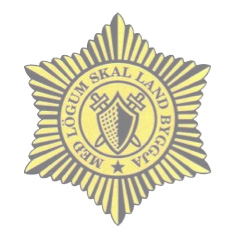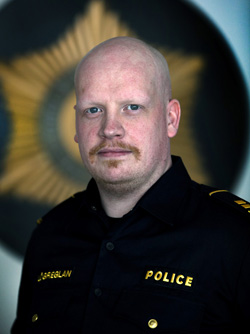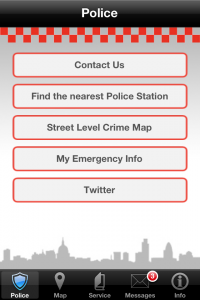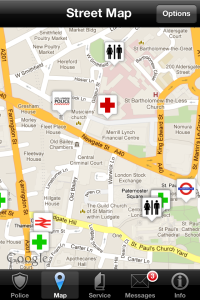 I wanted to thank you all for a very interesting group of people of which I consider to be at the forefront of new Policing – policing on a new digital front. My name is Thorir Ingvarsson, and serve as a a Detective Inspector for the Reykjavík Metropolitan Police (RMP) in Reykjavík, Iceland, and as of 1 June 2012 as the Social Media Manager. Prior to my appointment, I was a detective in the homicide/ sexual offences unit in Reykjavík.
I wanted to thank you all for a very interesting group of people of which I consider to be at the forefront of new Policing – policing on a new digital front. My name is Thorir Ingvarsson, and serve as a a Detective Inspector for the Reykjavík Metropolitan Police (RMP) in Reykjavík, Iceland, and as of 1 June 2012 as the Social Media Manager. Prior to my appointment, I was a detective in the homicide/ sexual offences unit in Reykjavík.
First, a little bit about Iceland and its police force. Iceland is situated in the middle of the Atlantic Ocean, equidistant between America and Europe. It´s a small country with an area of 103,000 km2 (40,000 sq mi) and a population of around 320,000 people. The Icelandic police serve on a federal level with approximately 650 police officers. There are 15 local police districts throughout the country, each having its own police commissioner. The Reykjavik Metropolitan Police are responsible for the largest police district in Iceland with 300 police officers and a population of more than 200,000 inhabitants. Iceland is one of the more sparsely populated countries in the world, but with one of the highest internet penetration in the world with over 97.8% internet penetration in Dec, 2011, according to the ITU.
In December 2010 the RMP opened up its Facebook site, being the first of the Icelandic police forces to do so. The site caught the attention of the Icelandic public and after one year of operation the Facebook site had 13,000+ fans and became a very active site posting, and more importantly – communicating with the public. This was due to a number of factors. First of all Facebook has a very high penetration count in Iceland, having over 222,000 registered Facebook accounts. Another factor being that the Icelandic police has always been an unarmed police force, one of the very few in the world, living in a small society; having a good relationship with the public being of utmost importance.
When the RMP´s Facebook site was opened the site was run by Police Commisioner Stefán Eriksson and Detective Thorir Ingvarsson. Soon the administrator group was expanded and now a group of 12 people have administrator privileges to the site. A private admin group was created on Facebook where the administrators can speak amongst themselves, discussing areas such as how to tackle various problems that come up. This is extremely important seeing that the speed of communication does not allow for a long response time and waiting for face time with the admin group would take far too long. The group members have several roles, those working in the field are encouraged to post on topics related to their daily work, especially the brighter sides of police work. Others have the responsibilities of moderation of the discussions and posting of press releases and such, as had been done before, but now getting a channel straight to the public, in a way, bypassing the conventional media.
The feeling amongst the group has been that now a direct line of communication has been opened to the public, where the police can publish, yet also engage with the public giving it a whole new dimension; the material gaining life of its own, being discussed, criticized or praised by the public. The public has been very happy with this new step in policing in Iceland and as of August 2012 the RMP´s Facebook site reached 23.000 fans – and is still rising.
Just a couple of examples.
On the 20th of June 2012 the RMP opened its Youtube channel, taking its first steps in building a platform to be able to broadcast its material. The material published there will at first be short infomercials created by the Icelandic traffic authority, which had previously been posted through the RMP´s Facebook site from time to time. Now the RMP has a platform in which it can link and use with their Facebook account, and publish material from partners, such as the traffic authorities but also creating a possibility for innovative employees who would see a chance to produce material suitable for police use on YouTube, e.g. with outside funding, such as non-profit organisations. Two weeks after its launch the channel now has 55 subscribers and just shy of 900 views. The scheduling of new material will hopefully begin this autumn but now enough material is available so that the site will, at least, post a short traffic video every two weeks until May 2013.
On the 25th of June 2012 a first in Icelandic policing was achieved when the RMP´s Facebook site published a post stating the whereabouts of an unmarked car with a traffic camera, that is, where that traffic camera would be situated that day. This was done to enhance the preventive nature of speed enforcement cameras used in the area and increase the awareness of these cameras to the public. This has caused an extensive amount of interesting dialogue with the public through the RMP Facebook site, even people discussing whether speed enforcement cameras are the right way to police. Overall this has been met with great enthusiasm from the public. There have been a large number of communications coming into the RMP from the public requesting that the cameras be positioned near their home, neighborhood or other places where they feel the need to bring speeds down. To enhance the effect of these posts, they are then followed by a comment at the end of the day, stating what result this speed enforcement yielded. This has also been very well received and gives the public information regarding whether this is truly paying off. A typical post at the beginning of the day would look like this:

Translation: Today, Monday, police will monitor speed using an unmarked police car. The speed check will be performed at Bugðu, in Norðlingaholt, and Barónstíg, in the Þingholt. (street names and areas). Both locations have been chosen due to request from the inhabitants close to these locations.
At the end of the day another posting is made:

Translation: 13 offences were recorded today at Bugða in Reykjavík. Vehicles traveling east Bugða, at Kólguvað in Norðlingaholt, were monitored. In one hour, after noon, 24 vehicles drove past and a majority (54%) of these were going too fast. The average speed of those offenders was 45 km/hr but at that location there is a 30 km/hr max speed. The one traveling the fastest was driving at 54 km/hr.
It will be very interesting to follow how the public will relate to these posts and the information given in them. Bearing in mind that the unmarked police vehicle with the speed camera has been in use for a number of years; and therefore data on previous behaviour is available and is usable to determine if there is a change in the behaviour of the drivers in these spots.
Where do we go from here?
There is no shortage on ideas, Because of the extraordinary support from the chief, I see the social media project taking the RMP further and providing an excellent opportunity for engagement in times where the police has less time for communication using conventional ways. One can also argue that the idea of the police officer walking his or her beat, could actually be tranfered into a digital reality where the public are spending more and more of their time. In addition to thinking of more ways for the public to engage with its police force, to ask, to give opinions and to make recommendations on how the police operate strengthening the ties and empowering the public.
In the next months the RMP will further explore how Social media can serve as a good tool in the policing toolchest. We will keep you informed.

Thorir Ingvarsson, is a Detective Inspector for the Reykjavík Metropolitan Police (RMP) in Reykjavík, Iceland. The Reykjavik Metropolitan Police Force is a finalist in the Large Agency category for the ConnectedCOPS Awards. Winners will be announced on September 11th, in Richmond, VA at The SMILE Conference™.










